Spring Offerings, Sacred Hustles, and Something to Bottom For
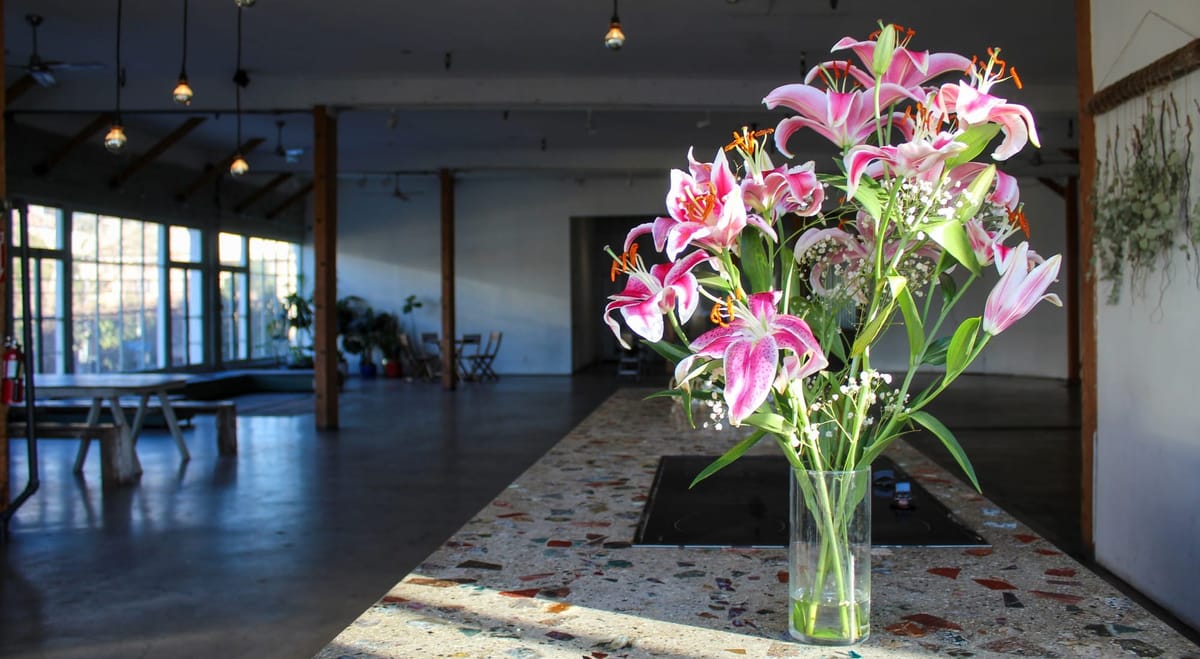
🌀 01. Spring Offerings for Artists, Founders & Dreamers
We’re live with three aligned offerings to help you organize your chaos, streamline your systems, and move your creative work forward — without burning out or selling out.
- 1:1 Clarity Sessions: Tailored support for artists, founders, and visionaries who need strategic clarity, operational grounding, or just someone to reflect with. These 2-hour, personalized sessions blend systems thinking, story work, and structure for the soul. → Book now via Calendly
- Creative Work◆Flow Template Bundle: Airtable templates to streamline grants, projects, and artist admin. → Download on Sendowl
- Workshop—Systems for Creatives Who Hate Systems: A live workshop on Monday, April 28 for anyone juggling too many projects and not enough clarity. Let's design a rhythm that works for you. → Reserve your spot now
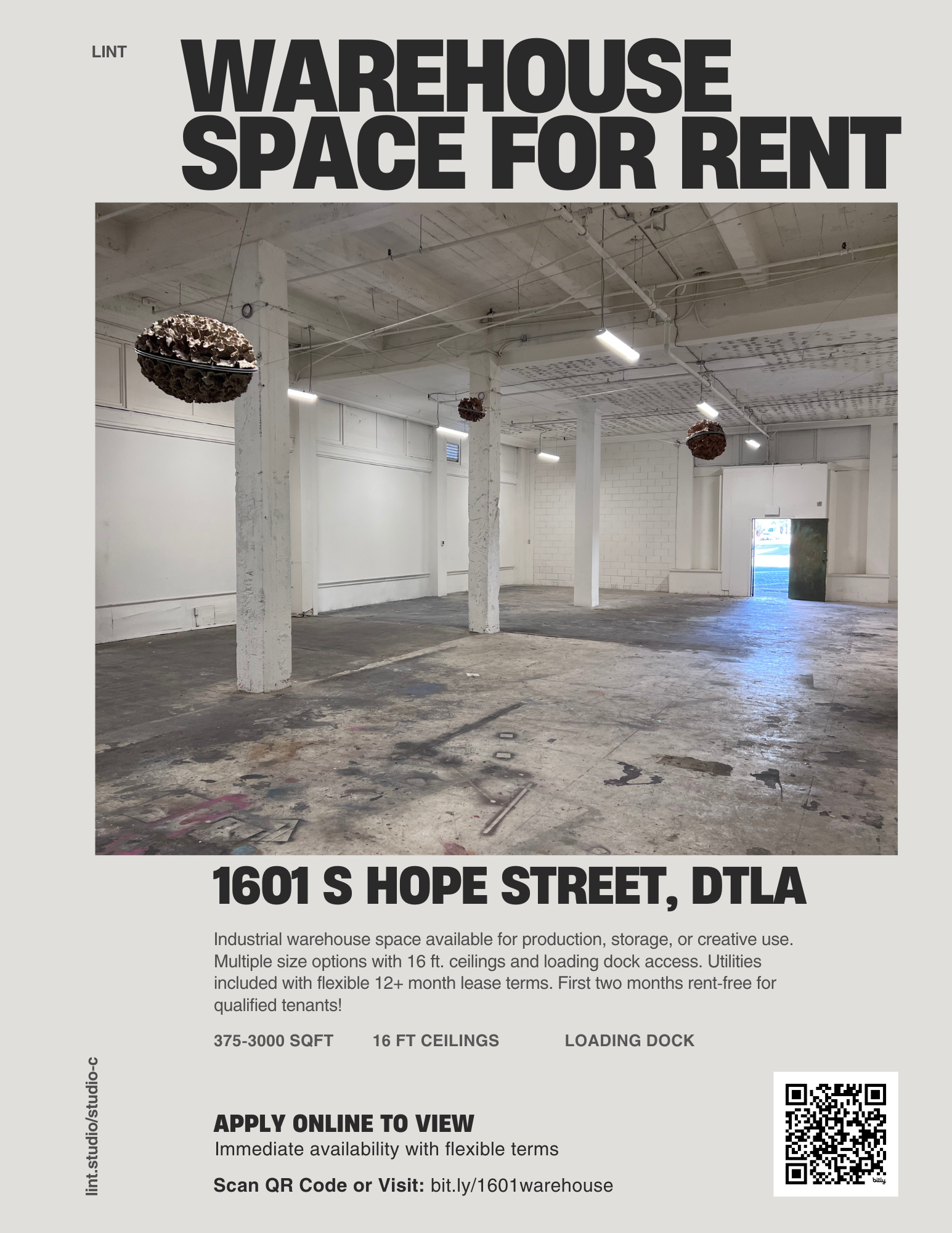
🏚 02. Warehouse Sublet at LINT
We’re seeking long-term subletters for Studio C: The Warehouse at 1601 S Hope Street in downtown Los Angeles.
- 375 - 3,000 sq ft
- Perfect for artists, builders, small production teams, or cultural projects
- Available May 1
→ Apply Here to Schedule a Viewing
Or reach out to 1601warehouse@gmail.com with questions.
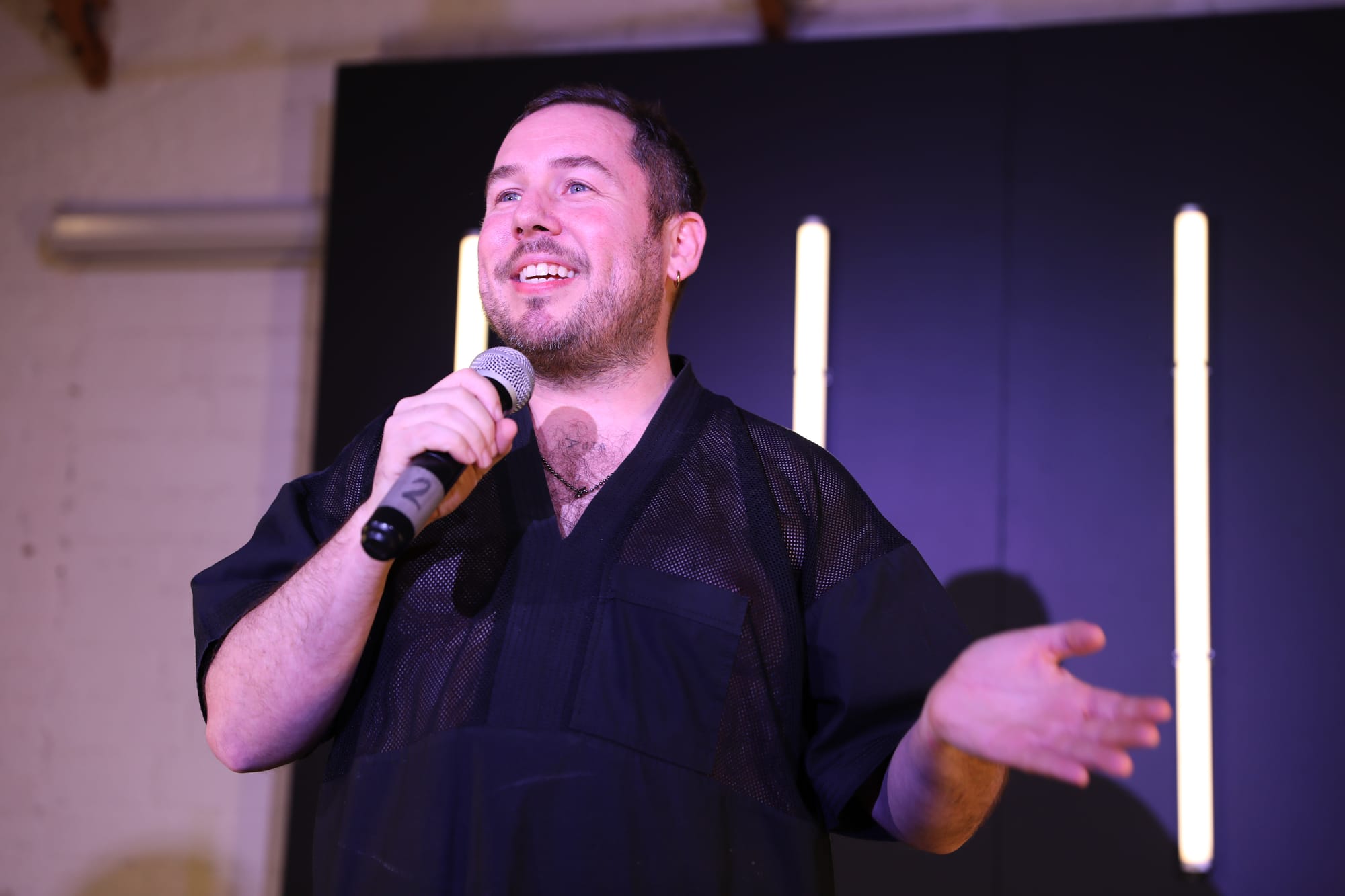
✝️ 03. Bottoming For Jesus — March Performances in Los Angeles + The Purpose Paradox
Last month, Bottoming For Jesus returned to the stage in Los Angeles. We’re still catching our breath. Photos from the performances are now live, along with a new companion essay:
The Purpose Paradox: Why We Keep Searching for Something That Can’t Be Found | A reflection on longing, irony, labor, and the slow death of meaning under capitalism.
📖 Read the full essay below.

🌲 04. BFJ Goes to Portland
We’re heading to Process PDX for a one-night performance on May 8, 2025.
Tickets on sale on Friday, April 11. Donations are welcome to support travel, collaborators, and the next evolution of this work.
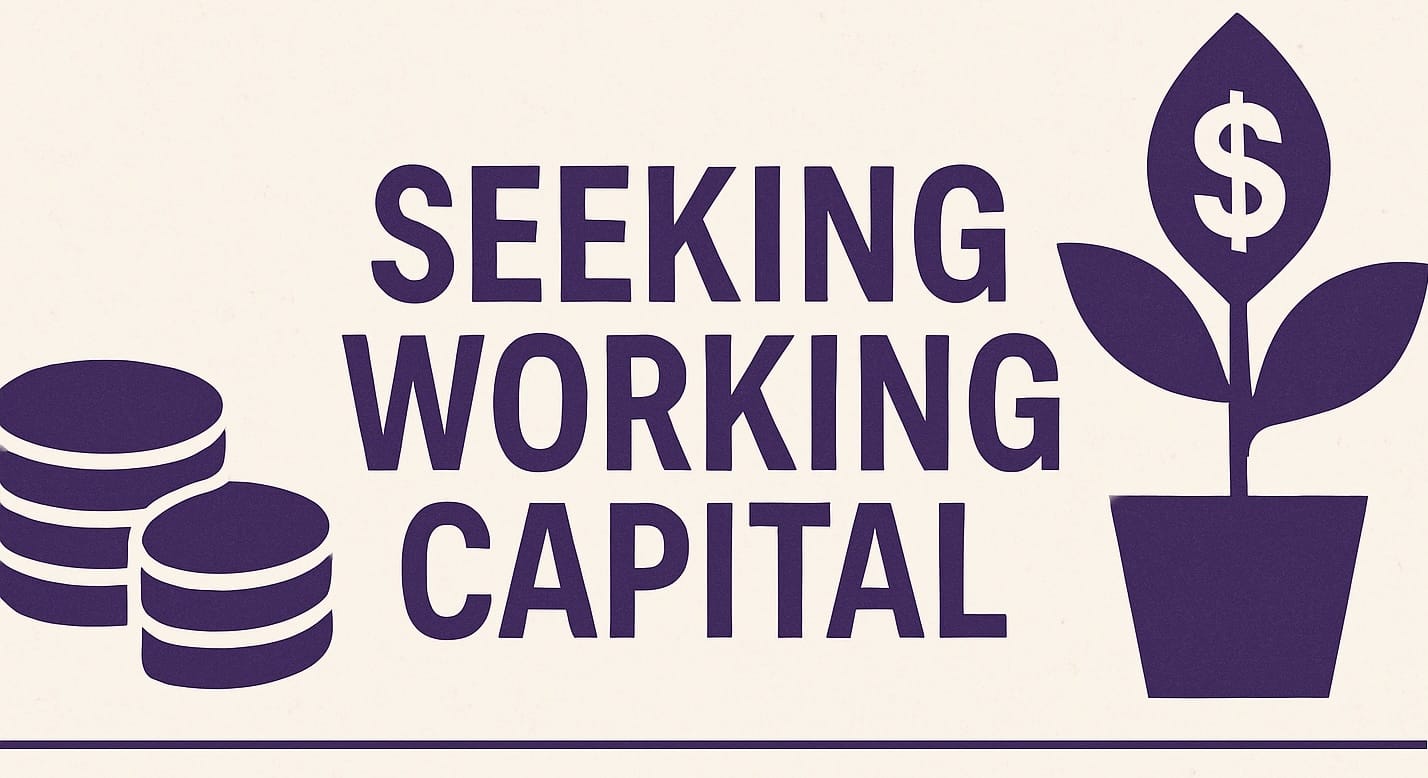
💸 05. Seeking Working Capital ($50K)
Family Affairs Studio is looking for values-aligned working capital to stabilize our operations, support upcoming artistic productions, and fund cultural infrastructure development in Los Angeles.
If you’re interested in contributing, investing, or opening that door for us:
→ Reach out to michael@familyaffairs.studio
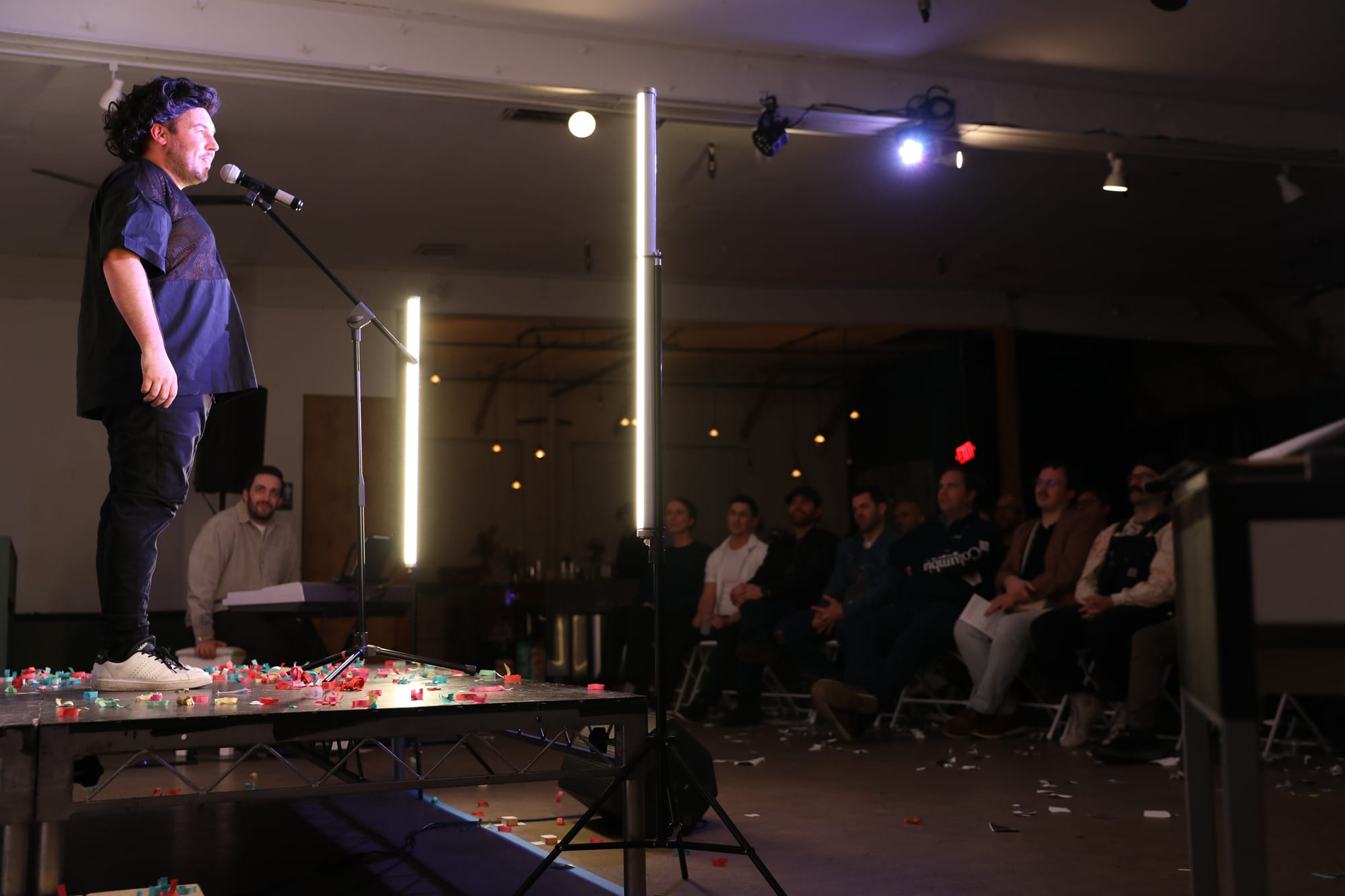
The Purpose Paradox: Why We Keep Searching for Something That Can’t Be Found
By Michael R. Speciàle
There's a beautiful irony in our relationship with purpose: the moment we start searching for it is the moment we've already lost it.
I've spent years oscillating between purpose-driven intensity and purpose-questioning despair. I converted to Mormonism at 15 on my own, looking for answers. I devoted myself to creating artistic community spaces in my 30s. I've read self-help books with titles like "The Purpose Driven Life" (meh) and "Finding Your North Star" (excellent). I've sat cross-legged in meditation retreats trying to locate my purpose like it was my favorite vape lost in the seat cracks of my car.
And now I find myself on stage, attempting to transform this lifelong quest into art – another purpose-seeking endeavor disguised as purpose-questioning critique. The circularity would be funny if it weren't so familiar.
The word "purpose" comes from Latin, meaning "to put forward" or "to place before oneself." It suggests an inherent directionality to human existence—this idea that life moves not just chronologically but teleologically, toward some end. The ancient Greeks had "telos" – a cosmic ordering principle where everything has its place and function. Christians transformed this into divine calling – God has a special plan just for you! Now capitalism sells purpose back to us in self-help books, corporate mission statements, and Instagram captions.
And nowhere is purpose more systematized than in the Mormon Church. These people have a PLAN. Missionary work, temple marriage, spirit babies, become a god of your own planet. It's like a cosmic MLM scheme where the ultimate upline is Jesus.
I found the neat linearity of Mormon purpose deeply comforting as a teenager. The path was clear: baptism, priesthood, mission, marriage, children, heaven. The Church offered what philosopher Charles Taylor calls a "strong framework" – a moral and spiritual map that places everything within a coherent order. In today's "age of authenticity," where we're expected to craft our own meaning from infinite possibilities, such frameworks can provide blessed relief from choice.
But here's the thing about purpose as a concept: it only becomes an obsession when you feel its absence. Fish don't question water. Medieval peasants didn't have vision boards. It's only when you're a clearly gay teenager kneeling beside your bed asking "WHY AM I HERE?" that purpose becomes this gaping void you're desperate to fill.
—
Our contemporary purpose anxiety reveals a peculiarly modern predicament. As traditional religious frameworks recede without clear replacements, the burden of meaning-making falls entirely on the individual. American individualism compounds this, creating both freedom and paralysis—with infinite choice comes infinite responsibility. Consumer capitalism transforms purpose into something we can purchase rather than practice, another product to acquire rather than a way of being.
What's particularly cruel about this purpose obsession is how it collapses the difference between work and calling. "Do what you love and you'll never work a day in your life" is gaslighting disguised as inspiration. For most of human history, purpose wasn't found in labor but in community, ritual, and belonging. Now we're expected to find existential fulfillment through our career while also paying rent in cities where housing costs have increased 170% faster than wages.
I look back at my various attempts at purpose-driven living with both tenderness and amusement. The Mormon missionary convinced he was saving souls. The theater kid certain that art would transform society. The community organizer believing a warehouse space could heal urban alienation. Each phase carried its own vocabulary, its own metrics of success, its own elaborate justifications.
These weren't failures, exactly. They were experiments in meaning-making – attempts to create coherence in a world that offers none inherently. The problem wasn't in the attempts themselves but in the expectation of arrival, of finally finding that singular, stable purpose that would make everything make sense.
—
What I've come to believe is that purpose may be better understood not as something we find but something we create through cycles of belief, belonging, and conscious action. It's less a destination than a practice of attention – a commitment to finding meaning in the mundane, connection in the chaotic, and beauty in the broken.
Perhaps the holes we try to fill—with religion, with sex, with performance, with belonging—are not deficiencies but essential spaces that keep us human. The gaps between our imagined purposes and lived realities might be precisely where the most profound human truths reside.
So when I sing about finding my purpose in Bottoming For Jesus, I'm both earnestly longing for it and gently mocking that longing. I'm honoring the eighteen-year-old who performed "Purpose" from Avenue Q in his high school recital, desperately believing his unique destiny was waiting just around the corner. And I'm acknowledging that while that teenager's earnestness was misplaced, his hunger for meaning wasn't wrong—just incomplete.
The most authentic purpose might be found not in having answers but in asking better questions. Not in arriving but in meandering. Not in filling holes but in transforming them into doorways.
Bottoming For Jesus will next be performed in Portland, Oregon at PROCESS PDX on May 8, 2025. Tickets on sale April 11.
You're reading work ◆ flow, a newsletter by Family Affairs Studio written by founder Michael Holt to share updates from our studio and content designed to help you reach flow in your creative venture or practice.
MICHAEL HOLT (aka Michael R. Speciàle) is a writer, artist, and cultural strategist working at the intersection of creative infrastructure, collective memory, and systems design. He is the founder of Family Affairs Studio and co-leads LINT, a boutique production house in downtown Los Angeles. From 2018-2024, he served as Executive Director of NAVEL, where he developed programming and support systems for artists and cultural workers. His work spans performance, critical writing, and consulting—offering tools, spaces, and frameworks for creative people trying to build something real (without losing their minds). He believes in tenderness, infrastructure, and composting failure.
FAMILY AFFAIRS STUDIO is a management consultancy and creative production company that empowers artists and organizations through strategic design and operational excellence. Founded by Michael R. Holt, we combine over 25 years of collective experience to help creative ventures navigate change with resilience and purpose. Our client collaborations include Robert Rauschenberg Foundation's Residency on Captiva Island, LA Commons, The Nest Creatives, Visions2030, Denniston Hill, Spenser Theberge, and Mandy Harris Williams. Through services ranging from organizational therapy to workflow automation, we build sustainable infrastructure that allows artists and cultural workers to focus on what matters most: their creative work.